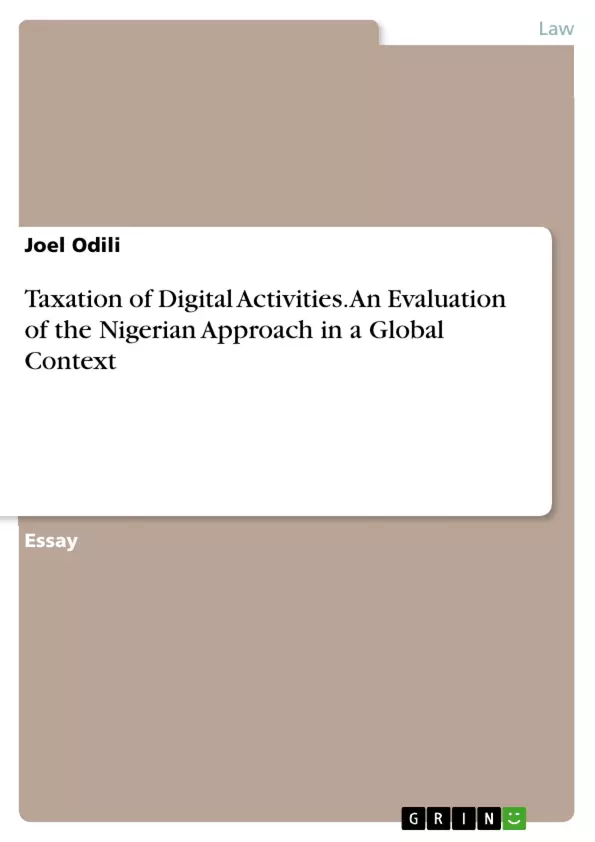The digital market, having grown to be one of the most lucrative globally, has prompted the desires of governments across the world to tax the profit that emerges from their territory because of these digital activities. However, due to the lack of physical presence of the Non-Resident Companies (being the major suppliers of digital services in Nigeria), taxation of the said activities have proven difficult. Being a key factor necessitating the shift from the old regime of taxing NRCs under section 13 of Companies Income Tax Act (CITA), to the enactment of the Finance Act 2019 which came into force on 13 January 2020.
Inhaltsverzeichnis (Table of Contents)
- Taxation of Digital Activities: An Evaluation of the Nigerian Approach in a Global Context*
- Introduction
- The Challenges of Taxing NRCs in the Digital Space
- The Introduction of the SEP Principle
- The OECD's BEPS Action Plan
- The Finance Act 2019 and SEP
- The SEP Order, 2020
- The SEP Scope for Digital NRCs
- The 25 Million Naira Threshold
- Implementation Issues and Challenges
- Conclusion
Zielsetzung und Themenschwerpunkte (Objectives and Key Themes)
This paper analyzes the Nigerian approach to taxing digital activities in a global context, focusing on the implementation of the Significant Economic Presence (SEP) principle as a means of addressing the challenges posed by non-resident companies (NRCs) operating in the digital space.
- The challenges of taxing NRCs in the digital space due to the lack of physical presence
- The evolution of the Nigerian tax framework to incorporate the SEP principle
- The practical application and implementation of the SEP principle in Nigeria, including the SEP Order, 2020
- The potential implementation issues and challenges arising from the SEP framework
- A comparative analysis of the SEP principle in other countries such as Israel and India
Zusammenfassung der Kapitel (Chapter Summaries)
- The introduction sets the context for the paper, highlighting the increasing importance of the digital market and the challenges faced by governments in taxing digital activities.
- The second chapter examines the challenges associated with taxing NRCs in the digital space, particularly in the context of the Nigerian legal framework. It analyzes the shortcomings of the previous physical presence requirement under the Companies Income Tax Act (CITA) and discusses how NRCs have exploited loopholes in the system.
- The third chapter delves into the introduction of the SEP principle as a solution to the challenges of taxing digital activities. It explores the origins of the SEP principle within the OECD's BEPS Action Plan and examines its implementation through the Finance Act 2019 in Nigeria.
- The fourth chapter provides a detailed analysis of the SEP Order, 2020, which outlines the specific criteria for determining SEP in Nigeria. It examines the three categories of SEP for digital NRCs and the 25 million naira threshold for triggering SEP.
- The fifth chapter discusses potential implementation issues and challenges arising from the SEP framework. These include the need for renegotiating tax treaties, the impact of currency fluctuations, and the potential resistance from NRCs in sharing data.
Schlüsselwörter (Keywords)
This paper focuses on the taxation of digital activities, non-resident companies (NRCs), Significant Economic Presence (SEP), the OECD's BEPS Action Plan, the Finance Act 2019, the SEP Order, 2020, and the challenges of implementing the SEP principle in Nigeria.
Frequently Asked Questions
Why is taxing digital activities difficult in Nigeria?
The main difficulty arises from the lack of physical presence of Non-Resident Companies (NRCs), which was a requirement under the old tax regime (CITA).
What is the Significant Economic Presence (SEP) principle?
SEP is a tax principle that allows a country to tax a foreign company based on its digital or economic interaction with the territory, even without a physical office.
What is the 25 Million Naira threshold?
Under the SEP Order 2020, digital NRCs are subject to tax in Nigeria if they derive an annual turnover of 25 million Naira or more from digital services provided to Nigerian customers.
How did the Finance Act 2019 change Nigerian tax law?
The Finance Act 2019 introduced the SEP principle, shifting away from the physical presence requirement to capture profits from the digital economy.
What are the challenges in implementing the SEP framework?
Challenges include the need to renegotiate international tax treaties, managing currency fluctuations, and potential resistance from companies regarding data sharing.
- Quote paper
- Joel Odili (Author), 2020, Taxation of Digital Activities. An Evaluation of the Nigerian Approach in a Global Context, Munich, GRIN Verlag, https://www.grin.com/document/1147667



